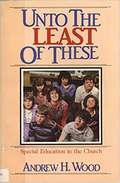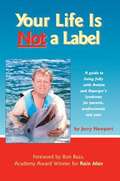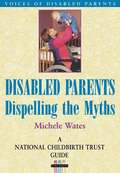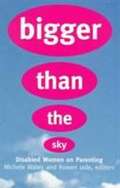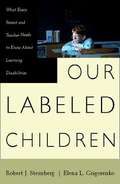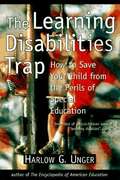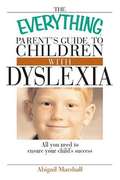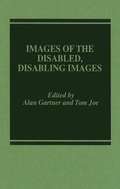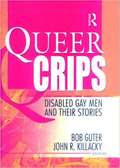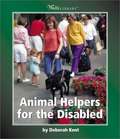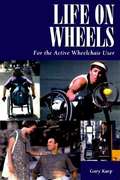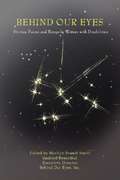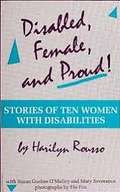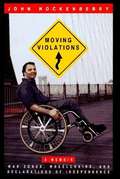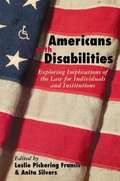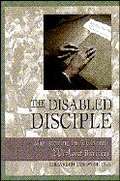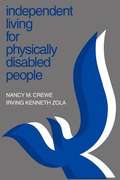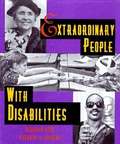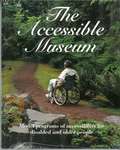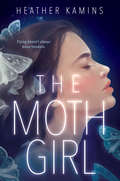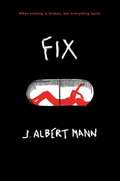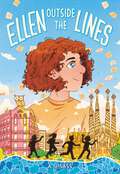Special Collections
Disability Collection
Description: Bookshare is pleased to offer a collection focused on the topic of disability and accessibility. #disability
- Table View
- List View
Unto the Least of These
by Laverne Webber and Ellen Glanville and Andrew WoodDescribes how to develop a ministry for the mentally retarded. Includes teaching strategies, discipline information, and other useful information.
Your Life is Not A Label
by Jerry NewportThis book describes Jerry's life and how he dealt with the challenges of Asperger syndrome. It also lets you, the reader know of things you should and shouldn't do, as well as Jerry's mistakes.
The Learning Disabled Child
by Suzanne H. StevensStevens gives parents what they need to determine whether or not their child has a learning disability. She then provides tips to help parents navigate the public school system in order to obtain help. She also presents adaptive techniques, discusses the therapies which are available and what they can do. She asks parents the tough questions which need to be answered if a learning-disabled child is to succeed in a regular classroom and adapt successfully to the disability. Clear, concises, informative, upbeat, practical.
Disabled Parents
by Michelle WatesPublished by the National Childbirth Trust of Great Britain, this book is largely based on a series of interviews with 21 physically disabled parents. All of the parents in the study had orthopedic disabilities, and most are wheelchair users. As the author assures us in the first chapter, "This is not another book about heroines." The interviewees talk honestly about the joys and frustrations of parenting, access issues, attitudinal barriers, support networks, dealing with professionals, and their efforts to show the world that their families are essentially "normal." Wates, a disability-rights activist who is herself a wheelchair user, also discusses several support groups for disabled parents which have emerged in the U.K., and makes suggestions about how such groups can be launched and maintained.
Bigger than the Sky
by Michele Wates and Rowen JadeIn this anthology the editors gather work by a variety of women with disabilities, united by the theme of parenting. Many contributors write enthusiastically about their parenting experiences; some explain their choice not to raise children; some write about meaningful relationships with children outside the traditional parent role. The authors represent disabilities including blindness, deafness, MS, post-polio, cerebral palsy, and cognitive and psychiatric disabilities.
Hands-On Parenting
by Debbie BaconChapters include topics such as: newborns and the basics, communicating with your child, organizing and children's clothing, toilet training, traveling with your children, social issues for blind parents, and toys and game suggestions for families.
Our Labeled Children
by Robert J. Sternberg and Elena L. GrigorenkoSternberg and Grigorenko, both psychologists and researchers at Yale University, are concerned that the way learning disabilities are assessed and treated in American school systems is not consistent. They argue that everyone is learning disabled in something, but that society only chooses to recognize disabilities in certain areas. They also note that lumping all children labeled learning disabled into this one category actually harms most of the children because they do not all have the same needs. The authors suggest that instead of this one form of remediation, the schools should develop a system through which the needs of each child are met on an individualized basis.
The Learning Disabilities Trap
by Harlow G. UngerWhy do educators seek to label more than one-third of our nation's schoolchildren as "learning disabled" when clearly they are not? This practical, easy-to-use book answers that question and shows parents of school-age children how to distinguish between normal learning differences and true learning disabilities; how to have your child properly evaluated at the first sign of a learning difficulty; how to help your child convert learning differences into learning advantages; how to select the right school or program for your child; and how to stimulate your child's intellectual development from infancy onward to enhance progress in school. This book shows parents how to give their children the learning tools and support they need. It also includes core curriculum milestones by which parents can evaluate their children's progress and lists of organizations and schools that can help.
The Everything Parent's Guide To Children With Dyslexia
by Abigail MarshallDyslexia affects 10 to 15 percent of the U.S. population. If you're the parent of a child with dyslexia you should read this book. The Everything(r) Parent's Guide to Children with Dyslexia, by Abigail Marshall gives you a complete understanding of what dyslexia.
Images of the Disabled, Disabling Images
by Alan Gartner and Tom JoeIn this collection of a dozen essays, writers with strong backgrounds in the disability rights movement examine the roots of public attitudes toward the disabled. Several essays consider portrayals of people with disabilities in literature, film, and journalism. Others explore social policy toward the disabled in education, employment, and health-care. Nat Hentoff's powerful piece, ""The Awful Privacy of Baby Doe," expresses the author's outrage over the case of a child born with spina bifida who was denied treatment because doctors persuaded her parents that she would be better off dead.
Queer Crips
by John R. Killacky and Bob Guterthis is an anthology of essays and short stories about gay men who are also disabled. Many of the stories and essays are taken from Bent, an on-line publication that gives voice to the often silent voices of disabled gay men.
Animal Helpers for the Disabled
by Deborah KentWritten for children in the middle grades, this book gives a brief history of the assistance-dog movement and the many ways in which dogs (as well as, in some instances, other animals) work as partners with people with disabilities. Chapters explore how assistance dogs are trained, living with an assistance dog, and legislation regarding access to public accommodations.
Life On Wheels
by Gary KarpThis book offers an initial road map to the lifelong, complex, and fascinating road of the disability experience. This book is primarily a guidebook for those with a mobility disability, with practical information about how to adapt your home, choose a wheelchair, explore your sexuality, take care of your body. This book is designed to help people make their adjustments sooner and more completely by explaining how one adapts to disability, and by addressing misconceptions that only delay your ability to adapt. Throughout it I have tried to foster the principles of choice, of control, and of your right to pursue your interests and convictions. Life on Wheels is also an effort to explain that inclusion is an innate right for everyone and that people with disabilities are excluded for reasons not based on a balanced or realistic understanding of what is possible. Its time our world caught up with the reality, closed that gap, and allowed millions of people with disabilities to play their full role in society.
Behind Our Eyes
by Marilyn Brandt SmithLaugh with the blind guy who gets in the wrong car and almost gets arrested. Cry with the little girl whose parents resent her blindness so much that they constantly break her spirit. Rejoice over battles won against burglars, abusive spouses, self-doubt, and health care personnel who keep forgetting their patient can't see. Reflect on the issues of employment, acceptance, independent travel, and the appreciation of nature and other hobbies. This anthology attempts to bridge the gap between how disabled people are viewed by society and how they really live. Read about the writers' workshop, and join the group if you enjoy writing.
Disabled, Female and Proud!
by Harilyn Rousso and Susan Gushee O'Malley and Mary SeveranceThis book contains stories of ten women with disabilities who are out doing it, raising families, working, and being active in their communities. Woven through this book is the history of the Disability rights movement. This book is directed towards teen women, but is a good read for all.
Let's Talk About Disabled People
by Pete A. Sanders"Let's talk about" looks at subjects of specific interest to young children and asks and answers the questions they most frequently raise. The series covers issues which affect children's lives or which add to their growing awareness of the world. This book talks about people who are differently abled, and helps children to understand how they feel when they have a temporary disability such as a broken arm, might be how a person who is permanently disabled feels.
Moving Violations
by John HockenberryParaplegic newscaster Hockenberry speaks as a thought-provoking journalist, an insightful iconoclast and a man defined, but never confined by a wheelchair.
Americans with Disabilities
by Anita Silvers and Leslie Pickering FrancisFew laws have sparked as much debate as the Americans with Disabilities Act (ADA), passed by Congress in 1990. With thought-provoking analysis by noted experts in a variety of fields, this book provides a keen understanding of the consequences of the law--for both those who oppose burdensome costs of the law and those who feel it must do more to protect citizens with disabilities from intolerance and social limitation.
The Disabled Disciple
by Elizabeth J. BrowneElizabeth Browne, a doctor of theology explores how the bible represents people with disabilities and how the church represents people with disabilities. Good book for ministers, or just people interested in Christianity who are blind or disabled.
Independent Living for Physically Disabled People
by Irving Kenneth Zola and Nancy M. CreweA text book for students in Rehabilitation Counseling classes.
Extraordinary People with Disabilities
by Deborah Kent and Kathryn A. QuinlanThis book tells the stories of 54 historical figures with disabilities. From people who were known for their disability like Helen Keller, Stevie Wonder and Heather Whitestone to people who made an impact on the world and not just amongst the disabled community, like FDR, Harriet Tubman and Thomas Edison. In addition to the biographies there are short histories of legislation that changed history for Americans with Disabilities.
The Accessible Museum Model Programs of Accessibility for Disabled and Older People
by American Association of MuseumsA very interesting guide to museums of all kinds, which cater to accessibility for disabled and older people.
The Moth Girl
by Heather KaminsFlying doesn&’t always mean freedom. Anna is a regular teenaged girl. She runs track with her best friend, gets good grades, and sometimes drinks beer at parties. But one day at track practice, Anna falls unconscious . . . but instead of falling down, she falls up, defying gravity in the disturbing first symptom of a mysterious disease. This begins a series of trips to the hospital that soon become Anna&’s norm. She&’s diagnosed with lepidopsy: a rare illness that causes symptoms reminiscent of moths: floating, attraction to light, a craving for sugar, and for an unlucky few, more dangerous physical manifestations. Anna&’s world is turned upside down, and as she learns to cope with her illness, she finds herself drifting further and further away from her former life. Her friends don&’t seem to understand, running track is out of the question, and the other kids at the disease clinic she attends once a week are a cruel reminder that things will never be the same. From debut author Heather Kamins comes a beautiful and evocative story about one girl&’s journey of choosing who she wants to be--in a life she never planned for.
Fix
by J. Albert MannIn this gritty, heart-wrenching mystery, prose and verse mix to explores themes of disability, pain, belonging, loss, addiction, and friendship.Everything was fine before. When Eve and Lidia could hide their physical differences inside goofy Burger Hut costumes. When Lidia shook Eve up and Eve made Lidia laugh. When Lidia was there. Everything is different now. Cut open . . . rearranged . . . stapled shut, Eve is left alone to recover in a world of pain and a body she no longer recognizes. Her only companions being a bottle of Roxanol and an infuriating (but cute) neighbor, Eve strikes up a relationship—and makes a pact—with the devil. Sacrificing pieces of a place she doesn't know to return to a place she does. What will she discover when she unravels her past? And is having Lidia back worth the price? In verse and prose, Fix paints a riveting picture of a teen struggling to find herself and move forward with her life in a sea of opioids, regret, grief, and hope.
Ellen Outside the Lines
by A. J. SassWinner of a Sydney Taylor Book Award Honor! A heartfelt novel about a neurodivergent thirteen-year-old navigating changing friendships, a school trip, and expanding horizons for fans of Rain Reign and Ivy Aberdeen's Letter to the World. Thirteen-year-old Ellen Katz feels most comfortable when her life is well planned out and people fit neatly into her predefined categories. She attends temple with Abba and Mom every Friday and Saturday. Ellen only gets crushes on girls, never boys, and she knows she can always rely on her best-and-only friend, Laurel, to help navigate social situations at their private Georgia middle school. Laurel has always made Ellen feel like being autistic is no big deal. But lately, Laurel has started making more friends, and cancelling more weekend plans with Ellen than she keeps. A school trip to Barcelona seems like the perfect place for Ellen to get their friendship back on track. Except it doesn't. Toss in a new nonbinary classmate whose identity has Ellen questioning her very binary way of seeing the world, homesickness, a scavenger hunt-style team project that takes the students through Barcelona to learn about Spanish culture and this trip is anything but what Ellen planned. Making new friends and letting go of old ones is never easy, but Ellen might just find a comfortable new place for herself if she can learn to embrace the fact that life doesn't always stick to a planned itinerary.
